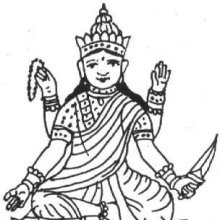Jvalamalini, Jvala-malini, Jvālāmālinī: 3 definitions
Introduction:
Jvalamalini means something in Buddhism, Pali, Jainism, Prakrit. If you want to know the exact meaning, history, etymology or English translation of this term then check out the descriptions on this page. Add your comment or reference to a book if you want to contribute to this summary article.
Images (photo gallery)
In Buddhism
Mahayana (major branch of Buddhism)
Source: De Gruyter: A Buddhist Ritual Manual on AgricultureJvālāmālinī (ज्वालामालिनी) (Cf. Jvālāmālin) refers to “one with a flame-garland” as occurring in the Heart-mantra (hṛdayamantra) taught to Vajrapāṇi, according to the Vajratuṇḍasamayakalparāja, an ancient Buddhist ritual manual on agriculture from the 5th-century (or earlier), containing various instructions for the Sangha to provide agriculture-related services to laypeople including rain-making, weather control and crop protection.

Mahayana (महायान, mahāyāna) is a major branch of Buddhism focusing on the path of a Bodhisattva (spiritual aspirants/ enlightened beings). Extant literature is vast and primarely composed in the Sanskrit language. There are many sūtras of which some of the earliest are the various Prajñāpāramitā sūtras.
In Jainism
General definition (in Jainism)
Source: archive.org: The Jaina Iconography1) Jvālāmālinī (ज्वालामालिनी) or Bhṛkuṭi is the name of the Yakṣiṇī accompanying Candraprabha: the eighth of twenty-four Tīrthaṃkaras or Jinas, commonly depicted in Jaina iconography.—[...] The Śvetāmbara Yakṣiṇī Bhṛkuṭī rides a cat (or swan) and her hands are adorned with a sword, club, spear and axe. The Digambara Śāsanadevī Jvālāmālinī or Jvālinī has a buffalo as her riding animal and holds in her hands disc, arrow, noose, shield, trident, sword, bow etc. Bhṛkuṭī’s symbol of a swan (according to Hemacandra) may be explained as identically the same riding animal for the husband Vijaya (Vijayo haṃsavāhana, Vide ante). Her other symbols as held in the hands are such as become a Yakṣiṇī or “guardian goddess”. Jvālāmālinī or Jvālinī or Mahājvālā as known to the Śvetāmbaras also assume, in the same name, the function of a Vidyādevī. Her symbol of a buffalo shows her symbolic connexion with her husband Vijaya, who, in Brahmanism, is synonymous with Yama, the famous rider of a Buffalo.
2) Jvālāmālinī (ज्वालामालिनी) or Mahājvālā also refers to one of the sixteen Vidyādevīs (goddesses of learning).—The text called the Ācāradinakara of the Śvetāmbaras describes this goddess as riding a cat but mentions no attributes. The Nirvāṇakalikā another text of the same sect describes her as riding a boar and holding many weapons without description. Images of Digambara type should ride a buffalo and bear such weapons as a bow, shield, sword and disc. The Yakṣiṇī of similar name we find as attached to Candraprabha. The Śvetāmbara Yakṣiṇī has a cat as her vehicle like the present goddess and the Digambaras also has the common vehicle of a buffalo. The underlying idea of the Jvālāmālinī representation seems to have been derived from the consort of Yama, whose symbol is a buffalo. The cat symbol is also held by a Brahmanical deity named Ṣaṣṭhī.
Source: HereNow4U: Svasti - EssaysJvālāmālinī (ज्वालामालिनी):—In contrast to Padmāvatī, Jvālāmālinī is a more distinctly southern Digambara goddess in her popularity. According to Jain iconography and mythology, she is the yakṣī or śāsanadevī of the eighth Jina, Candraprabha, but in many respects her cult is independent of his.

Jainism is an Indian religion of Dharma whose doctrine revolves around harmlessness (ahimsa) towards every living being. The two major branches (Digambara and Svetambara) of Jainism stimulate self-control (or, shramana, ‘self-reliance’) and spiritual development through a path of peace for the soul to progess to the ultimate goal.
See also (Relevant definitions)
Partial matches: Jvala, Malini.
Starts with: Jvalamalinika, Jvalamalinistotra.
Full-text: Mahajvala, Jvalini, Jvalamalin, Danavirya, Nagakesara, Bhrikuti, Shyamayaksha, Vidyadevi, Candraprabha, Naga.
Relevant text
Search found 4 books and stories containing Jvalamalini, Jvala-malini, Jvālā-mālinī, Jvālāmālinī; (plurals include: Jvalamalinis, malinis, mālinīs, Jvālāmālinīs). You can also click to the full overview containing English textual excerpts. Below are direct links for the most relevant articles:
Jain Remains of Ancient Bengal (by Shubha Majumder)
The twenty-four Tīrthaṅkaras and their Yakṣas and Yakṣiṇīs < [Chapter 6 - Iconographic Study of Jaina Sculptural Remains]
Images of Tīrthaṅkara Candraprabha (Introduction) < [Chapter 6 - Iconographic Study of Jaina Sculptural Remains]
Lalitopakhyana (Lalita Mahatmya) (by G.V. Tagare)
Chapter 25 - Flight of Viṣaṅga
Chapter 37 - Description of other inner Apartments in the Royal Chamber
Chapter 43 - Types of Initiation and True Service of the Preceptor
The Agni Purana (by N. Gangadharan)
Jainism in Odisha (Orissa) (by Ashis Ranjan Sahoo)
Iconography of Sasanadevis < [Chapter 6]
Iconography of Jain Gods and Goddess < [Chapter 6]
